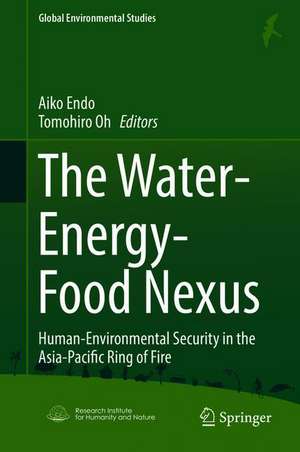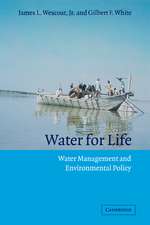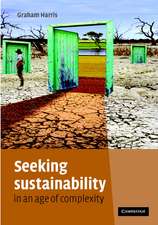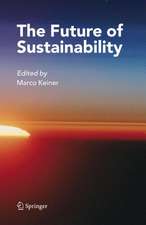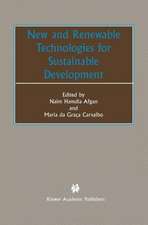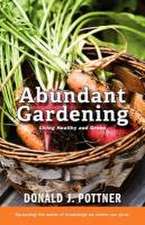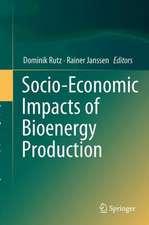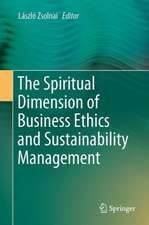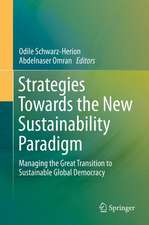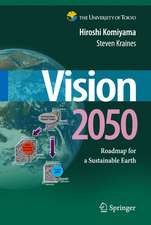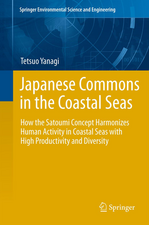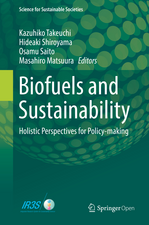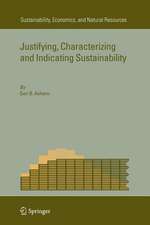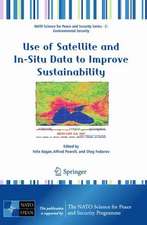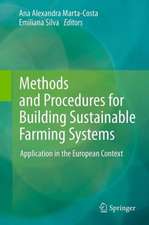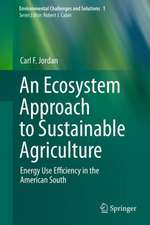The Water-Energy-Food Nexus: Human-Environmental Security in the Asia-Pacific Ring of Fire: Global Environmental Studies
Editat de Aiko Endo, Tomohiro Ohen Limba Engleză Hardback – 26 apr 2018
The content integrates a variety of academic disciplines, including not only the natural sciences (e.g. hydrology, coastal oceanography, costal aquatic bioscience, fisheries, environmental earth science etc.) but also the humanities and social sciences (e.g. marine policy, environmental energy policy, resource governance, policy process theory etc.). The book can be used as a textbook for undergraduate and graduate-level sustainability science courses. Further, its practical content and trans-disciplinary approach to addressing nexus issues with stakeholders offers vital information for practitioners and administrators alike.
| Toate formatele și edițiile | Preț | Express |
|---|---|---|
| Paperback (1) | 845.12 lei 38-44 zile | |
| Springer Nature Singapore – 14 feb 2019 | 845.12 lei 38-44 zile | |
| Hardback (1) | 1012.70 lei 22-36 zile | |
| Springer Nature Singapore – 26 apr 2018 | 1012.70 lei 22-36 zile |
Preț: 1012.70 lei
Preț vechi: 1235.01 lei
-18% Nou
Puncte Express: 1519
Preț estimativ în valută:
193.77€ • 202.86$ • 160.34£
193.77€ • 202.86$ • 160.34£
Carte disponibilă
Livrare economică 17-31 martie
Preluare comenzi: 021 569.72.76
Specificații
ISBN-13: 9789811073823
ISBN-10: 9811073821
Pagini: 390
Ilustrații: XI, 337 p. 158 illus., 86 illus. in color.
Dimensiuni: 155 x 235 x 20 mm
Greutate: 0.81 kg
Ediția:1st ed. 2018
Editura: Springer Nature Singapore
Colecția Springer
Seria Global Environmental Studies
Locul publicării:Singapore, Singapore
ISBN-10: 9811073821
Pagini: 390
Ilustrații: XI, 337 p. 158 illus., 86 illus. in color.
Dimensiuni: 155 x 235 x 20 mm
Greutate: 0.81 kg
Ediția:1st ed. 2018
Editura: Springer Nature Singapore
Colecția Springer
Seria Global Environmental Studies
Locul publicării:Singapore, Singapore
Cuprins
Part I Introduction .- 1 Introduction: Human-Environmental Security in the Asia-Pacific Ring of Fire: Water-energy-food Nexus .- Part II Water-Energy Nexus (Water for Energy Production) .-2 Assessment of Potential Small hydropower Generation: A Case Study in Otsuchi, Iwate Prefecture, Japan .- 3 Hazard-specific Vulnerability Mapping for Water Security in a Shale Gas Context .- 4 Exploring Future Water Demand and Climate Change Impacts on Water Availability in the Peace Region of British Columbia, Canada .- 5 Monitoring Hot Spring Aquifer Using Repeat Hybrid Micro-gravity Measurements in Beppu Geothermal Field, Japan .- 6 Evaluation of the Shallow Geothermal Potential for a Ground-Source Heat Exchanger: A Case Study in Obama Plain, Fukui Prefecture, Japan .- Part III Water-Food Nexus (Water for Coastal Ecosystem Conservation) .- 7 Lacustrine groundwater discharge in southern Laguna de Bay, Philippines .- 8 Submarine Groundwater Discharge and its Influence onPrimary Production in Japanese Coasts: Case Study in Obama Bay .- 9 Relationships Between Submarine Groundwater Discharge and Coastal Fisheries as a Water-Food Nexus .- 10 Tradeoff Between Hot spring Use and River Ecosystem: The Case of Beppu City, Oita Prefecture, Japan .- Part IV Governance and Management of Resource System .- 11 The Water-Energy-Food Nexus and California’s Sustainable Groundwater Management Act .- 12 Pump Tax, Basin Equity Assessment and Sustainability in Groundwater Management: Orange County Water District Experience .- 13 Utilization of Environmental Water Resources in the Reconstruction of Otsuchi Town After the 2011 Tsunami .- 14 Experience of Disaster and Recognition of Local Re-Sources: A Survey of a Tsunami-Damaged Town in Japan .- 15 Serious Matters Related to Development of Small-scale Geothermal Power Generation in Beppu-Onsen Hot Spring After 2011 .- Part V Understanding Socio-economic dimension of Resource System .- 16 Social Acceptability of Micro Hydropower in Laguna, Philippines .- 17 Socio-economic Vulnerability and Benefits to the Community Associated with Floating Fish Cages in the Jatiluhur Reservoir .- 18 Accounting for Externalities in the Water Energy Food Nexus .- 19 Making Social Networks Visible: Shared Awareness .- Among Stakeholders on Groundwater Resources .- Part VI Inter- and Trans-Disciplinary for Approaching Nexus Issues .- 20 An Interdisciplinary Approach for Water–Energy–Food Nexus .- 21 Assessment of Collaboration Process in Interdisciplinary Research of Water-energy-food Nexus by Means of Ontology Engineering .- 22 Scenario-based Approach to Local Water-energy-food Nexus Issues with Experts and Stakeholders .- Index.
Notă biografică
Aiko EndoResearch Institute for Humanity and Nature , Kyoto, Japan
Tomohiro Oh
Research Institute for Humanity and Nature , Kyoto, Japan
Tomohiro Oh
Research Institute for Humanity and Nature , Kyoto, Japan
Textul de pe ultima copertă
This book highlights the water-energy-food nexus as one of the most important and fundamental global environmental issues facing the world. Climate and social changes are putting increased pressure on water, energy and food resources. As water is the central aspect within this cluster, the book focuses on the inherent tradeoffs in water resources between producing/consuming energy and food. In addition, it discusses an inter- and trans-disciplinary approach to understanding the complexity of the water-energy-food nexus system, and creating policy options to reduce the tradeoffs among resources.
The content integrates a variety of academic disciplines, including not only the natural sciences (e.g. hydrology, coastal oceanography, costal aquatic bioscience, fisheries, environmental earth science etc.) but also the humanities and social sciences (e.g. marine policy, environmental energy policy, resource governance, policy process theory etc.). The book can be used as a textbook for undergraduate and graduate-level sustainability science courses. Further, its practical content and trans-disciplinary approach to addressing nexus issues with stakeholders offers vital information for practitioners and administrators alike.
The content integrates a variety of academic disciplines, including not only the natural sciences (e.g. hydrology, coastal oceanography, costal aquatic bioscience, fisheries, environmental earth science etc.) but also the humanities and social sciences (e.g. marine policy, environmental energy policy, resource governance, policy process theory etc.). The book can be used as a textbook for undergraduate and graduate-level sustainability science courses. Further, its practical content and trans-disciplinary approach to addressing nexus issues with stakeholders offers vital information for practitioners and administrators alike.
Caracteristici
Explores the academic nexus concept and develops nexus tools to understand the complexity of the water-energy-food nexus system, pursuing an interdisciplinary approach Suggests that water use for producing/consuming food or energy on land might affect fisheries production in coastal areas, based on the hypothesis that the flow of nutrients from land to ocean affects coastal ecosystems Offers essential data and tools from the natural sciences, humanities and social sciences for addressing nexus issues
